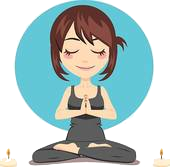Today’s society is fast-past and on demand. As a result, the ability to relax is a crucial skill to learn. When used regularly as Wellness Tools, relaxation and stress reduction techniques have the potential to reduce and relieve stress and anxiety, in addition to increasing overall wellness. There are many ways that you can learn relaxation and stress reduction techniques; you could work with a counselor, take a course, read books, listen to a CD or even watch a DVD on this topic to become informed. Back in the early 1980s, when I first began to work intensively on addressing issues in my life, I worked with a counselor who taught me the importance of learning to relax. Through her valuable instruction, I became aware of the tension I had been holding in my body almost all my life. The more I practiced these techniques, the better I felt. – Mary Ellen Copeland
If you find stress or anxiety to be a recurring issue for yourself, studying relaxation methods could help you feel better. I suggest that you learn how to relax when you are feeling well. It then becomes an easily accessible Wellness Tool that you can use anytime, anywhere. Trying to learn to relax in the midst of a Crisis or a difficult time can be difficult.
anywhere. Trying to learn to relax in the midst of a Crisis or a difficult time can be difficult.
Many people, including myself, find that practicing relaxation exercises every day at a regular time is helpful. My own Wellness Recovery Action Plan includes practicing each day as part of my Daily Maintenance. It is on my Triggers Action Plan as an option if I experience a Trigger. I definitely do at least two relaxation exercises per day if I am experiencing Early Warning Signs, and at least four a day When Things are Breaking Down. You can figure out what works for you.
Some common relaxation exercises that you might want to learn include:
- Breathing Awareness
- Deep Breathing
- Inner Exploration
- Mindfulness
- Progressive Relaxation
- Guided Imagery
You might also try:
- Getting a massage
- Visual Cues – Certain colors can be relaxing and help you feel better.
- Aromatherapy – Expose yourself to something that smells good.
- Listen to or Make Music
- Learn Yoga
- Take a Warm Bath
- Play with Children or Pets
Start small. Little changes can make big differences. I find that the “power of small changes” is enormous. Even on the most stressful day, if I develop or use Wellness Tools that are just little changes — like tea instead of coffee; driving a different way and paying attention to the difference in the scenery, I become more relaxed and better able to enjoy my day.
“There are only 4 things you can do around stress – Avoid, Alter, Adapt or Accept.” It certainly helps to do all the things on your daily Maintenance list. I have found using tools that adjust my senses helpful. Things like a hot bath, listening to music even at work, watching a fireplace roaring or holding hands relives stress. They all involve the senses.”
“A car needs at some time to be turned off so why would you not think you would not need a tune-up or tune-down?” Yvonne Z Smith
One thing I think is most important is the value of fun and creativity. They bring a sense of well-being, energy, and even hopefulness. Wellness Tools are very often fun and creative. I think it is important for us to do ourselves the favor of accumulating as many different kinds of wellness tools as possible. Never stop searching for things you enjoy and that will add peace and wellness to your life. Then use them, use them, use them! Use them every day. Having a really terrific Wellness Toolbox is essential to the whole dynamic of WRAP. It is a good idea to be on the lookout for new wellness tools every day and to develop the ability to create wellness tools on the spot to fit the situation. For example, if it’s raining outside and your picnic is ruined, don’t fret — spread that red and white tablecloth on the living room floor, put on some fun music and have a great time. Any time we are thwarted, we can use existing wellness tools, or use our creativity to come up with brand new and powerful tools!
Read more on Relieving Stress & Anxiety in WRAP for Life

Mary Ellen Copeland, PhD, developed Wellness Recovery Action Plan (WRAP) with a group of people with lived experience who were attending a mental health recovery workshop in 1997. She is the original author of the WRAP Red Book, as well as dozens of other WRAP books and materials. She has dedicated the last 30 years of her life to learning from people who have mental health issues; discovering the simple, safe, non-invasive ways they get well, stay well, and move forward in their lives; and then sharing what she has learned with others through keynote addresses, trainings, and the development of books, curriculums, and other resources. Now that she is retired, and that, as she intended, others are continuing to share what she has learned, she continues to learn from those who have mental health issues and those who support them. She is a frequent contributor to this site.





